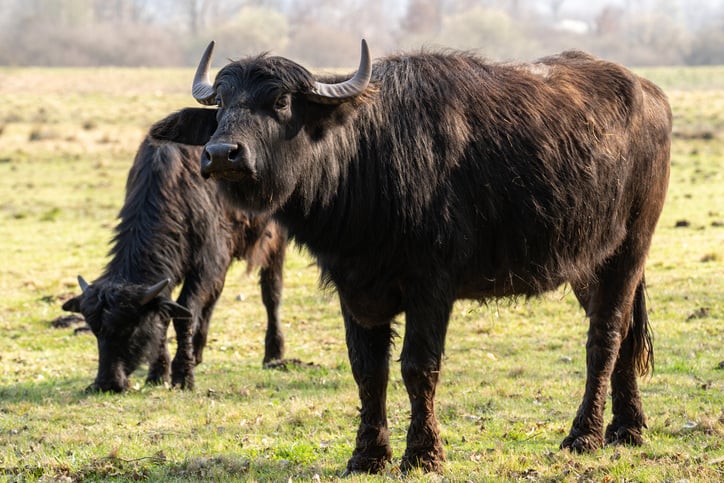Domesticated buffaloes, or water buffaloes, have historically been seen as multipurpose animals. Nowadays, due to their milk’s nutritional composition and associated health benefits, the subspecies with the highest representation, river buffaloes, are predominantly used for milk production¹. Although buffaloes are widely distributed, most of them are found in India and Pakistan, making these countries the largest producers of buffalo milk. In Europe, Italy stands out for its production of the well-known mozzarella cheese.
Prefer to listen to this article? Click the play button below and enjoy our podcast!
Buffaloes are the world’s second largest milk producers, after cows. According to FAO, approximately 144 million tons of buffalo milk were produced in 2022, with 98% of this output produced in Asia. Buffalo milk can be consumed fresh but is primarily used in dairy products such as cheese, yoghurt and others. Its composition and yield are highly influenced by numerous factors, including breed, diet, number of lactation and environmental conditions¹.
Although both are highly nutritious, when compared to the cow’s milk in terms of composition, buffalo milk contains higher concentration of important nutrients¹, which may lead to important benefits for both the manufacture of dairy products and human health. In this article, we will highlight the top 5 benefits of buffalo milk: energy source, healthy fat content, differentiated protein content, improvement of the immune system, and promotion of bone health.

Energy source
Each milk components plays a unique role in physiological functions, and when working together, they help to satisfy the nutritional requirements for growth and performance in both humans and calves. Buffalo milk presents high levels of fat (the major component), lactose (the second one), as well as significant amounts of protein, minerals, fatty acids, vitamins, and bioactive compounds². These unique characteristics make buffalo milk a natural health adjuvant³. With its high fat and protein level, this milk is an outstanding source of energy with great nutritional value, supporting performance and regulation of numerous bodily functions².
Healthy fat content
Fat is the dominant element in buffalo milk, accounting for 7 to 8%³. When compared to cow milk, it contains nearly twice the amount. Its consumption, however, should be moderate considering its high caloric content. Nevertheless, it is an important source of fatty acids, such as omega-3 and omega-6, although their levels can differ according to the production system³. With slightly lower cholesterol levels than cow milk, buffalo milk could potentially be beneficial for cardiovascular health¹.
Differentiated protein content
Protein plays an important role in several functions, including growth, performance, and repair of the body. Buffalo milk contains a high quantity of protein, offering a good biological value of this nutrient.
Made up of all essential amino acids, this milk promotes a wide range of positive health impacts, such as strengthening bones and cardiovascular health³.
The milk protein consists mainly of casein, and the widespread form is beta-casein A1 with a lower prevalence of the A2 form. Cow’s milk can have both or only one. As far as buffalo milk is concerned, only the A2 form is displayed. The difference between these two forms is that some individuals have difficulties digesting beta-casein A1, which can cause gastrointestinal disorders. In these cases, buffalo milk would potentially result in better digestion. Nevertheless, more research is required to sustain this information⁴.

Improvement of the immune system
Buffalo milk contains significant amounts of vitamins A, C, B12, as well as minerals like calcium and bioactive compounds. These nutrients counteract free radicals - molecules that damage our cellules - through the antioxidant proprieties of these components². Along with its antioxidant capabilities, these nutrients also help to enhance the immune system³.
Buffalo milk has shown evidence of containing probiotic properties which have the potential to boost the immune system and defend against gastrointestinal problems³.
Promotion of bone health
Another benefit that sets buffalo milk apart from other milk producers is its mineral content, with calcium being the most abundant. Alongside calcium, other minerals like magnesium, potassium, phosphorus, zinc, and others, work together to promote bone growth, development, strength and preventing conditions associated with a deficiency of these components³.
Furthermore, minerals can rely on the support of casein, the prevalent milk protein, which appears to strengthen bones, and therefore reduce the risk of injuries³
Take home messages
- Buffalo milk is a good source of key nutrients.
- Is an important health adjuvant with action on different systems of the body. However, due to its high calorie content, it should be consumed in moderation either as raw or in dairy products.
- Its high nutritional content makes it ideal for producing high-quality dairy products.
- More research is needed to improve the quality, yield and profitability of these products, as well as to substantiate claims about positive health effects.
- The lack of systematization in milk production leads to inconsistencies in nutritional content.
- Considering the increasing demand for healthier products, and due to its advantages, A2 buffalo milk is likely to become more acknowledged.
An interesting fact about buffalo milk is that people allergic to cow’s milk, may tolerate buffalo milk better². However, further investigation is needed to support this assumption.
References
- Abd El-Salam MH, El-Shibiny S. A comprehensive review on the composition and properties of buffalo milk. Vol. 91, Dairy Science and Technology. 2011. p. 663–99.
-
Ahmad S, Anjum FM, Huma N, Sameen A, Zahoor T. COMPOSITION AND PHYSICO-CHEMICAL CHARACTERISTICS OF BUFFALO MILK WITH PARTICULAR EMPHASIS ON LIPIDS, PROTEINS, MINERALS, ENZYMES AND VITAMINS. Vol. 23, Proc Int Workshop Dairy Sci Park. 2013.
-
Emakpor OL, Edo GI, Jikah AN, Ikpekoro VO, Agbo JJ, Ainyanbhor IE, et al. Buffalo milk: an essential natural adjuvant. Vol. 4, Discover Food. Springer Nature; 2024.
-
de Oliveira LSM, Alves JS, Bastos MS, da Cruz VAR, Pinto LFB, Tonhati H, et al. Water buffaloes (Bubalus bubalis) only have A2A2 genotype for beta-casein. Trop Anim Health Prod. 2021 Dec 1;53(1).
-
FAOStat, World Livestock Primary, Production Quantity, https://www.fao.org/faostat/en/#data/QCL , accessed in November 2024
About the author
Cláudia Costa (Researcher at FeedInov Colab)
Cláudia Costa holds a degree in Veterinary Nursing, and a Master's degree in Quality Control and Food Toxicology. Currently is a researcher at FeedInov Colab, in the Nutrition and Feeding, and One Health departments. Her works focuses on the chemical and nutritional characterization of animal feed, with a specific interest in valorizing agro-industry by-products, and new feed alternatives. She worked as a research fellow in the field of livestock animals’ nutrition and has a veterinary nurse in clinical and hospital environment.
Explore author’s articles


Leave your comments here